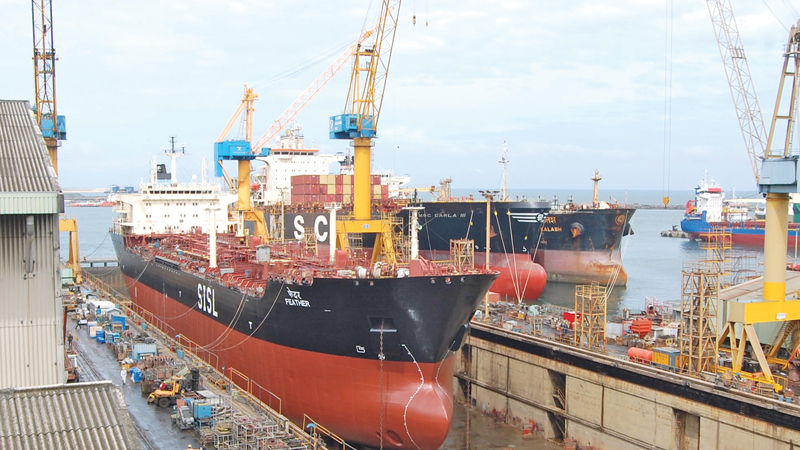With the acquisition of the Colombo Dockyard PLC (CDPLC) by the Indian Defence Ministry’s Mazagaon Dock Shipbuilders Ltd., (MDSL) last week, India’s position in Sri Lanka’s maritime domain vis-à-vis rival China, has been strengthened.
Given Colombo Port’s strategic location in the Indian Ocean, it has been eyed by regional powers India and China since 2010. And the competition has manifested itself in various forms.
The Colombo Dockyard PLC(CDPLC) had been a joint venture of the Sri Lankan Government and the Japanese Onomichi Dockyard Company Ltd., (Onomichi for short) since 1974. The CDPLC had been a success all along until the Sri Lankan financial crisis in 2022, when the country defaulted on its loans and its economy tanked.
According to Lloyd’s List, the CDPLC had been a major asset as it was capable of handling vessels up to 125,000 dwt. It has serviced more than 200 ships annually. Even last year, the yard delivered two 5,000 dwt bulk carriers and was awarded contracts for four more, Lloyd’s List said.
But 2023 proved to be a disastrous year for CDPLC. It registered a loss of Sri Lank Rs.11.1bn (U$ 38.2m). This was attributed to “poor performance in the shipbuilding sector and the economic crisis which saw exchange rates tumble and inflation skyrocket.”
According to an English weekly newspaper, requests made on behalf of the Japanese company for Government intervention to curb the impact of debt servicing went unanswered. However, seeing the gravity of the situation, the Government, at the end of 2024, began to search for a suitable partner to keep CDPLC going.
But according to the publication several “powerful nations were expressing concern” about which entities were wanting to acquire control of the Port. Be that as it may, on its part, Onomichi’s condition was that it would sell its shares to “any strategic investor willing to commit to the CDPCL’s business.”
Enter Mazagaon Dock Shipbuilders
Last week, the Indian Defence Ministry-owned Mazagaon Dock Shipbuilders Ltd.,(MDSL) announced that it had acquired 51 percent of the stake in CDPCL previously held by Onomichi. According to Llyod’s List, the deal is worth US$ 52.96 million.
This marked MDSL’s first international acquisition. “MDSL begins its transformation from a domestic shipbuilder to a regional maritime player with global ambitions. This move strengthens India’s regional maritime influence and expands MDSL’s global reach,” the company said in a social media post on X on June 27.
The MDSL’s credentials are impressive. It has built 805 vessels since 1960, including 30 warships, ranging from advanced destroyers to missile boats as well as eight submarines. For its Indian and global clientele, it has built cargo and passenger ships, supply vessels, multipurpose support vessels, water tankers, tugs, dredgers, fishing trawlers, and barges. MDL reported strong financial results in the third quarter of 2024, showing a net profit that had surged by 29 percent Year on Year.
Geopolitical dimension
India, which was already in the race to acquire control over Colombo Port, had seized the opportunity created by Onomichi’s exit with alacrity, before China could seize it.
After China got to set up a container terminal (the Colombo Container Terminal or CCT), India wanted to build and run the Eastern Container Terminal (ECT)and Sri Lanka agreed to the proposal.
But the decision to give it to India clashed with the policy of not giving ports to foreign countries. This caused tension with India especially because India saw the hidden hand of China in the controversy.
However, given India’s geopolitical heft, which was bigger than China’s, the project to build the Western Container Terminal (WCT) was given to the Indian group, the Adanis in 2021.
In 2022, when Sri Lanka defaulted on repaying loans, India bailed the Sri Lankan Government out by promptly giving aid to the tune of US$ 4 billion, while China was dragging its feet. With that New Delhi’s influence over Sri Lanka increased.
In July 2023, a joint statement issued at the end of Prime Minister, Ranil Wickremesinghe’s visit to New Delhi said that the two countries would ” cooperate in development of Ports and logistics infrastructure at Colombo, Trincomalee and Kankesanthurai with an aim to consolidate regional logistics and shipping, as per mutual understanding.”
More importantly, the statement said that the two countries would “establish land connectivity between Sri Lanka and India for developing land access to the ports of Trincomalee and Colombo, propelling economic growth and prosperity in both Sri Lanka and India, and further consolidating millennia-old relationship between the two countries. A feasibility study for such connectivity will be conducted at an early date.”
However, in December 2024, the joint communique issued after President Anura Kumara Dissanayake’s visit to New Delhi omitted the land connectivity part but spoke about cooperation in ensuring maritime security.
The December 2024 joint communique said – “Recognising shared maritime security interests in the Indian Ocean Region, both leaders agreed to jointly pursue strengthening regional maritime security, both bilaterally and through existing regional frameworks. In this regard, the leaders welcomed the recent signing of the Founding Documents of the Colombo Security Conclave headquartered in Colombo. India reiterated its support to Sri Lanka in advancing the objectives of the Conclave.”
Connectivity projects
The omission of the land connectivity plan did not come as a surprise, as the National Peoples’ Power (NPP) Government led by President Dissanayake was expected to be cautious about agreeing to connectivity projects.
But over time, the Dissanayake regime has grasped the geopolitical power of India in the region and yielded to Indian sensitivities. In deference to India’s security concerns, the NPP Government does not allow foreign oceanographic research vessels to do any work in Sri Lankan waters. Recently, the Government disallowed the Food and Agricultural Organization’s research vessel Nansen, though it had requested a visit in 2023. The decision might have been, at least partly, due to the fact that India and Sri Lanka had formally agreed to cooperate in hydrographic surveys.







